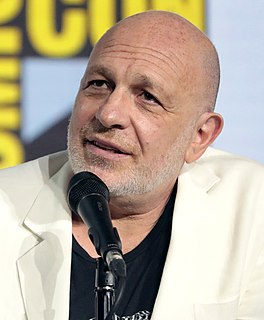A Quote by Paul Auster
The biggest book for me, when I was fifteen, was Crime and Punishment, which I read in a kind of fever. When I put it down, I thought, if this is what novels are then I want to be a novelist.
Related Quotes
Today the crime novelist has one advantage denied to writers of 'straight' or 'literary' novels. Unlike them he can range over all levels of society, for crime can easily breach the barriers that exist in our stratified society. Because of these barriers the modern literary novel, unlike its 19th-century predecessors, is often confined to the horizontal, dealing only with one class. But crime runs through society from top to bottom, and so the crime novelist can present a fuller picture of the way we live now.
I had people read it early on and, you know, well-meaning people said to me, you should take out the blogs. I didn't get much positive feedback. Only because most of these people were protective of me - it was sort of like a "tone it down, make it easier to swallow" kind of thing. And I just thought if I do that then it's not the book I want to write.
He’s bound to have done something,” Nobby repeated. In this he was echoing the Patrician’s view of crime and punishment. If there was a crime, there should be punishment. If the specific criminal should be involved in the punishment process then this was a happy accident, but if not then any criminal would do, and since everyone was undoubtedly guilty of something, the net result was that, in general terms, justice was done.
The best crime stories are always about the crime and its consequences - you know, 'Crime And Punishment' is the classic. Where you have the crime, and its consequences are the story, but considering the crime and the consequences makes you think about the society in which the crime takes place, if you see what I mean.
Adaptation is always the same process for me, which is some version of throwing the book at the wall and seeing what pages fall out. It is trying to imagine, remember the story, read it, put it down, and then write sort of an outline without the book in front of you with some hope that what you like about it will be filtered and distilled out through your memory and then that will be similar to what other people like about it.
I still love books. Nothing a computer can do can compare to a book. You can't really put a book on the Internet. Three companies have offered to put books by me on the Net, and I said, 'If you can make something that has a nice jacket, nice paper with that nice smell, then we'll talk.' All the computer can give you is a manuscript. People don't want to read manuscripts. They want to read books. Books smell good. They look good. You can press it to your bosom. You can carry it in your pocket.
A truly good book attracts very little favor to itself. It is so true that it teaches me better than to read it. I must soon lay it down and commence living on its hint. When I read an indifferent book, it seems the best thing I can do, but the inspiring volume hardly leaves me leisure to finish its latter pages. It is slipping out of my fingers while I read. It creates no atmosphere in which it may be perused, but one in which its teachings may be practiced. It confers on me such wealth that I lay it down with regret. What I began by reading I must finish by acting.
































